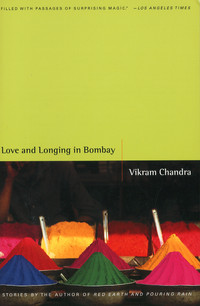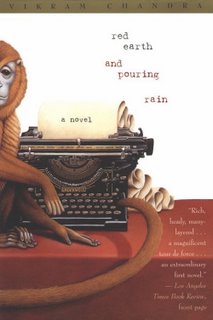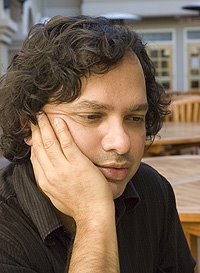Telling Tall Tales
I went to my first book reading session last evening on 21 August 2006 at the Taj Mansingh Hotel in New Delhi. Vikram Chandra, an Indian author, whose third book, Sacred Games just made it to the market, was on a promotional tour.
I looked forward to it, first for the simple reason that I thoroughly enjoyed, Love and Longing in Bombay (LLB), his second book and a collection of short stories narrated by a weird retired civil servant in a dorky Mumbai bar.
Sacred Games is the development of a character from LLB in the story titled Kama. Sartaj Singh is a Sikh and a cop. I liked the cop character, though you might think that he was rather filmi, a suffering, intense and a hard cop types.

I was also looking forward to the book reading bit to assess my own personal position on such marketing devices for books. Some people have very strong opinions on such media over hype.
The Reading
The evening was rather slow and the show got on the road at 7.30 instead of 7 pm as the invitation listed. I dressed myself pretty sanely and rather formally in a Khadi untucked shirt and formal trouser matched with my sandals. I took care of my appearance precisely cause the few times I have been to such gatherings, I have felt sorely under dressed and out of place.
I only have access to such gatherings due to friends in influential positions or let us just say convenient positions. Therefore, the book reading news comes to me mainly through the city supplements of The Times of India (Delhi Times) and The Hindustan Times (HT City). They are mostly seen as Page 3 affairs with socialites pandering about in their costumes.
The bits and snatches of conversation I got were rather fake and as typical of Page 3 conversations as the stereotype goes. I was sitting near some academic from JNU who was actually doing the superficial yapping with her journalist friend. I saw one other old TV actor (Vinod Nagpal the guy from Hum Log) and I recognized no one else. Maybe we were all Page 3 wannabes, books were our tool to get clicked.
They served us fruit juices to start with, I guess they did not want anyone drunk before the author read though I kept looking and asking around for wine, in as respectable a manner as one who asks for wine when only fruit juices are available can get. Two dirty stares from waiters, I said a polite thank you and changed my tone to, do you have pineapple juice?
And after a really trite introduction, Rahul Singh of Penguin India took the floor and built some momentum when he mentioned the author’s experimentation with form. The author Vikram Chandra did actually carry out a pretty brazen narrative technique in his first highly acclaimed novel called Red Earth and Pouring Rain, hinting and using the multitude of narrative form that the South Asian literary tradition especially ancient and vernacular literature is rich in. I couldn’t get by the book, despite repeated attempts to read it. And as someone mentioned, it was too verbose, but since my effort was way too early, I just can re collect that I could not and did not read the book.

In the meanwhile there was some awkwardness as Vikram Chandra, when asked to come on the stage screwed up a bit, which he later attributed to nervousness and two left feet. Vikram also sat beatifically on the couch of the stage while the photographers went hammer and tongs clicking him. Then there was the usual ribbon tied book which was untied by Chandra and the camera flashes went working over time again. The audience was mostly well behaved and despite requests to switch off cell phones, two did go on during the reading, one was particularly sickening, loud and shrill.
One of the important points for me about the reading was the fact that the person who has created and written the story and the nuances of the characters actually gets to read it out. It is proverbially hearing from the horse’s mouth. And I did want to experience it and see and judge for myself, how much of a difference, does it make. Essentially does it color the imagery of the context and the characters?
And so Chandra took the microphone dressed in a Chinese collared White shirt and black trouser. Taking a slim frame of metallic glasses, Chandra thanked the gathering and got on with the evening.
He read two excerpts from the book. The first was the protagonist Sartaj Singh's and his constables visit to a local restaurant to collect money from a dance bar owner. The descriptions were nice though not very arresting, something we have all been thru..."Mr. A slid into the rexene topped seat..." and the conversation was desultory. It is towards the end of this first narration that some characterization is hinted at when the dance bar owner tells the cop that the girls love him.....and for the police raid which they are arranging instead of just five required to be arrested, if the Cop comes himself more than ten want to be present. This bit also had an exposition of the corruption and the money making devices of the Mumbai Police and why they have to be corrupt as state funding merely provides them the money for the Panchnamas and nothing beyond that.
The second extract was situated much later in the book and was about Ganesh Gaitonde, the G company boss who has been arrested and is in jail and is plotting his escape. This bit had some Hindi cuss words which Chandra got through easily and lightly without the proper dramatic intonations. This section was very dramatic and filmi...it was easy to imagine the scene and for me it fit in with the filmi imagery we have all been fed since we could make sense of images.
Cocktails
So the evening's reading was over and the gathering broke for cocktails and some snack.
I rushed about for wine but decided at the last moment to take in Chivas Regal, the scotch I definitely cannot afford and tucking in pretty smoothly some knick knacks here and there as and when available. I was served about seven to ten minutes after I put in the request despite being at THE bar. That is because the old veteran actor Vinod Nagpal, kept making drinks for other people. Now I didn’t know how to disrespect and slight a man who I have seen only on TV and that too when I was like in half pants. So despite his brazenness, when he turned around and looked at me, I gave him my best 'elders should be respected' smile which was obviously ignored as his glance passed over me and settled on someone he knew.
But after a few snack inputs and just one whiskey I headed towards Chandra for some conversation.
I have never met many authors beyond my own friends. I know three who have written books: two are on the way to getting published already. The one person who I met was William Dalrymple (a British guy settled in Delhi and making money out of our history: imagine his gall or our country’s white man complex). Dalrymple was as socially apt as a nin-com-poop and offensive too. In that particular meeting William, the author, and I were meeting on equal terms as guests of a common acquaintance. I was there with two friends of mine, one of who is almost an author. In the little conversation we had, we did try to give it back to Darylample all the little rude unpleasantness he emited before he left our table in a rather ungainly effeminate manner.
Vikram Chandra
So Chandra was there, not really being mobbed (cocktails and snacks were being way laid simultaneously) and was being asked interesting questions by what I took to be a diligent journalism student.
Vikram Chandra has a pretty deep Hindi films background. His mother was a scriptwriter, one of his sisters is Tanuja Chandra who makes not so bad but neither watchable rip off's of Hollywood movies. Her first film was the Kajol starring Dushman, after that I never followed her even in the Delhi Times listings. Chandra's other sister is Anupama Chopra author of The Making of Sholay and a film journalist and who is married to Vinod Chopra, the now ascendant, always very talented film makers. Chandra, himself, teaches Creative Writing at UC-Berkeley and so is in US for eight months and the rest he spends in Mumbai.

The diligent student was asking Chandra questions about any relationship between Chandra's new book and Ram Gopal Verma the Hyderabad-Mumbai film maker who made a living out of underworld movies. She had obviously asked him other questions before which I saw scribbled in her note book in proper sophomoric fashion.
So I open the conversation with the reference to Kama, the story in LLB, out of which the character of the Sikh Cop who is the main character in Sacred Games, grew out of.
Was it a later realization that the story Kama grew to Sacred Games?
Chandra replied in the affirmative and said that yeah, it actually hit him much later that there was potential in the character.
So I asked him why a Sikh, did it make for great style, which is what I think. The Cop is very stylish and quiet compelling.
VC replied that well the style is more related to characterization but he fit into well into the Mumbai underworld scene being the proverbial 'outsider' to the crime scene in Mumbai. The crime scene in Mumbai while earlier dominated by the South Indians (how can Madrasis be criminals, I mean who would believe or get scared of a South Indian criminal unless they were armed as well as the LTTE!) was later taken over by my fellow Northern brethren from one particular district in Uttar Pradesh, namely Azamgarh.
By this time there were others milling around the author, I thought from his Mayo circles and I was getting slowly pushed to the periphery. But I managed to slip in one last ditch question...
This last question was regarding his writings and the influence of Hindi films. Beyond the filial tiles to the industry, Chandra himself has co-written the film Mission Kashmir and also helped with the making of 1942 A Love Story, both produced and directed by his brother in law, Vinod Chopra.
Chandra did not really answer this question despite actually addressing it when he said that maybe his imagery is very obviously colored by that pervading Indian influence and more so also due to his proximity to the film culture. Then Chandra was embraced by I suppose one of his old friends who had been standing at his side for as long as ten minutes and giving me dirty looks for keeping Chandra off him.
The final point was when Chandra stated that with films there are too many creative compromises to make, too many people have a stake in it but the book he said was his. He did what he wanted to do...with no one to please...but his story telling ambitions....
And thus I decided to move out of that charmed circle for that particular evening and head home for another round of alcohol but after I drained by glass of the whiskey and gorged in more snacks. There was Oyster in some sauce available too but I kept away owing to the experiences of my dear friend Aya who actually plugged the invitation and accompanied me to the reading (or I accompanied her, goes both ways you see).
But I found Vikram Chandra very good humored, social, even a bit shy and totally unassuming. It was a pleasure to meet him, a real pleasure.
Reading into the ‘Reading Session’
I did not buy the book and so I did not try to get Chandra's signature/autograph. I am broke, really broke.
The key question raised by someone was, Will Chandra's reading affect my own images of the book? This in the sense that while reading a book we let our imaginations roll and create images for us, on how we perceive and take in what we read, ignoring some bits, highlighting others, maybe totally in contrast with what the author intended. That is my license as a reader, yeah; I espouse and attest to the existence of a reader’s creative license too!
And if Chandra’s reading does create a particular moment of awkwardness when I do read the book, I think I can safely move on and deal with my own imagery and point of view beyond the passages he read out. The book is big about 900 pages; I will take a few months to even try to procure the book to read.
But I do concede with the fact that it was more a social outing than a literary one, there were old friends meeting and I suppose the regular's were catching up on each other.
Disappointment
I was disappointed at there not being a public question and answer session with the author while he was on stage. This means that the author speaks more formally and less anecdotally talking about his craft and some members of the audience could have been expected to ask good questions. It is rather unfortunate to be left with your single self and intelligence when you meet such personalities, it does not leave me feeling inadequate, but well it could.

6 comments:
hey man.....looks like u creepin into page3 parties huh!......
amazin minutae abt the session....
Reddy :)
Very interesting account Satya- I found your take on the whole page 3 phenomenon hilarious. I too was very dissapointed by Red Earth...and i liked love and longing...
interesting take on Darymple (I'm sure i misspelled that)- i agree he is pompous or comes across like that but i like his travel writing a lot- i think some of the best i have read...
so as usual i find your writing very interesting and disagree with something...its the foundation of our friendship perhaps?
Deepa
Nice take...And how come they were serving oyster in snacks,
So what did you come back with? Is mktg important, or necessary, at all to sell a book?? Remember we are talking about a different market segment here, where reacinh thousand original copies makes a book a blockbuster. Mind you, Vikram Chandra had got a 7-mn.$ advance to publish his literary counterpart of 'Satya' (the movie).
Have never read Chandra, his books have been written in my corporate-rut days..
yeah, Reddy, you knew I was a wannabe, didnt you....hehehe
Now I know where that hit on the map comes from...so its you...thanks...dude keep hitting....
and Deepa, the hit on my map also points to you checking the blog thanks..keep hitting.....
No, i dont think we disagreed much except of course on hindi films...that was vast the chasm between our perceptions....maybe that could be exaplained by your NRI birth...but hoho...thats not as bad as the NRI's i abuse for scrweing up the film industry....
abhigyan, it was some kind of oyster in some sauce...they were served in those small tequila glasses delhi bars...use...no clue....it couldnt have been live oyster's, they would have been thrashing about...live oysters are good as an aphrodisiac...will try it somewhere sometime..
as for the market bit. i understand that the book market is very different and I think in that sense it does make sense to have such small even if societal parties...because if i hazard a guess about the kind of people there...they did appear more of the literay bent of mind...or so if i conclude that i over heard a JNU faculty member and C. Rajamohan was sighted in the lounge prior to the book release....so I guess it goes about creating a buzz and if i stretch it further and think there were a lot of journo's...
but the point here was of an author selling his book through public appearnces...no doubt publishing as an industry has changed so much.....but like do we even know what Tolstoy looked like?
Yeah we did not even know what Ved Vyasa looked like, BR Chopra was slightly better, and if Mani Ratnam makes his flick, then everybody wld know what does he look like...
I guess signs of changing times
the absence of question and answer session itself showed that those bool release parties are for Page 3 things....Even writer should be "cool" (living in US or UK and having white wife or GF)in contemporary world and that is precisely why those Hindi writers cannot be under the spotlight.
I thought I should write more but I cannot since I have not read his novel. But I found him nice.
And again, we should avoid eating raw oysters. It is horrible if you got food poisoning. People say that it is better not eat them in months which have letter R. (Wait a sec! It was August! Shit! You might have missed scarce chance...)
Honestly...the publishers should lower the price of book instead of launching such an parties...if they really think of book lovers.
Post a Comment